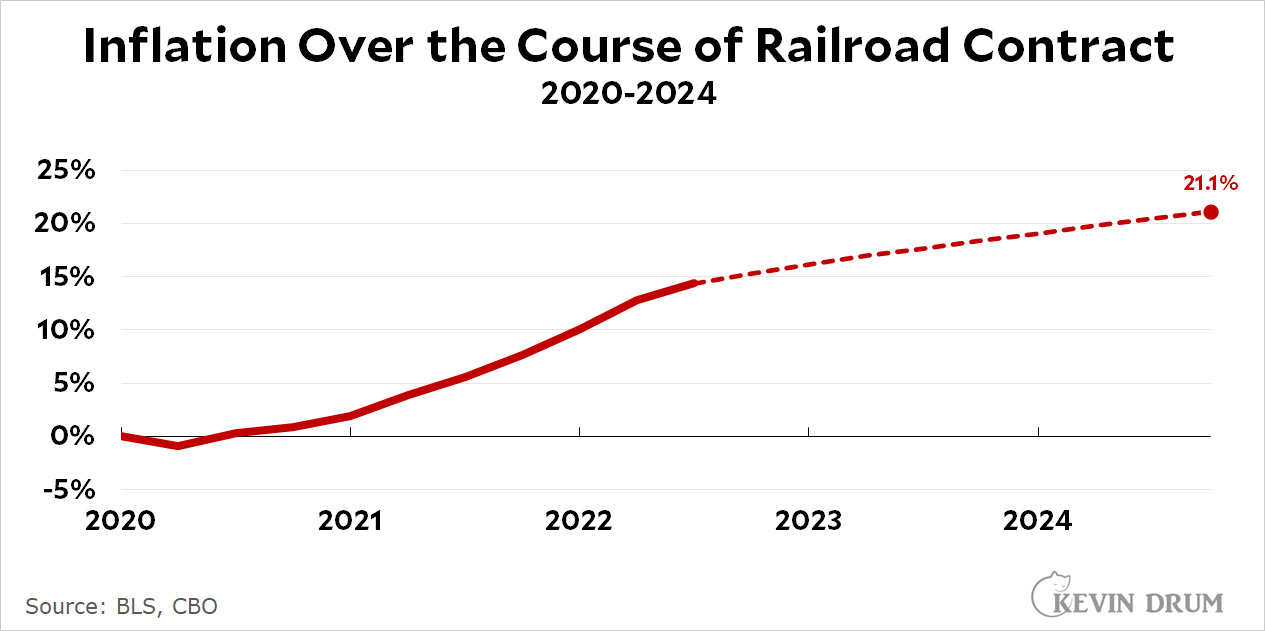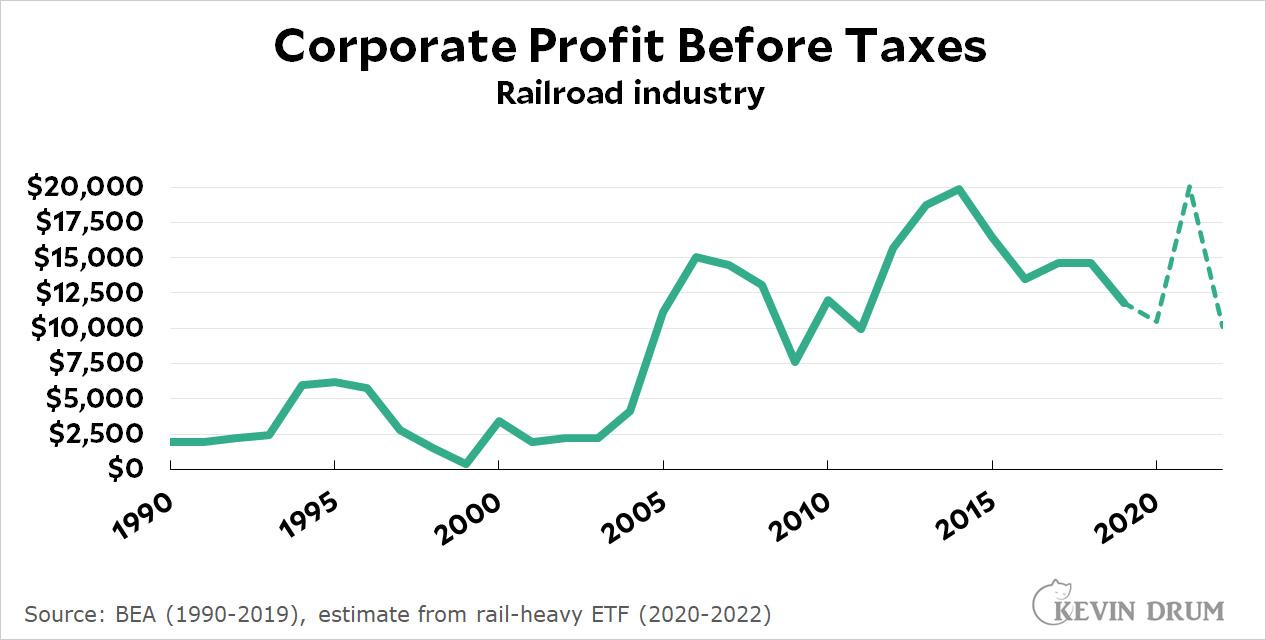What should we think of the railroad contract that's been rejected by several of the rail unions and raises the prospect of a nationwide strike that would sorely test the economy? Let's review.
First off, the railroad carriers have agreed to a 24% wage increase over five years (from 2020 to 2024). That sounds pretty good, but I will bore you as usual with my admonition that you should always account for inflation:
 The solid line is actual inflation. The dashed line is an estimate of future inflation from the Congressional Budget Office. It amounts to 21% over the life of the contract, which means workers are getting a real increase of 3%. That's 0.6% per year. Both sides have agreed to this, but color me unimpressed anyway.¹
The solid line is actual inflation. The dashed line is an estimate of future inflation from the Congressional Budget Office. It amounts to 21% over the life of the contract, which means workers are getting a real increase of 3%. That's 0.6% per year. Both sides have agreed to this, but color me unimpressed anyway.¹
The other big issue is sick leave. This isn't an issue for workers with ordinary 40-hour-per-week jobs, but it's a big issue for workers in the field. These workers face schedules that are increasingly unpredictable as railroads squeeze their timetables to increase profits.
 But it's a weird issue. Rail workers currently get 11+ personal days and the new contract gives them one more. These days can be used for anything at any time, including sick leave. What's more, rail workers already have sick days, but they're unlike the sick days you and I are used to. Each year, the first incidence of illness pays nothing for the first seven days while illnesses after that pay nothing for the first four days. After that, sick pay benefits kick in. Roughly speaking, it means workers get no time off for, say, having a cold, but do get paid for more serious illnesses that require a substantial amount of time off.
But it's a weird issue. Rail workers currently get 11+ personal days and the new contract gives them one more. These days can be used for anything at any time, including sick leave. What's more, rail workers already have sick days, but they're unlike the sick days you and I are used to. Each year, the first incidence of illness pays nothing for the first seven days while illnesses after that pay nothing for the first four days. After that, sick pay benefits kick in. Roughly speaking, it means workers get no time off for, say, having a cold, but do get paid for more serious illnesses that require a substantial amount of time off.
The reason for this—as well as management's unwillingness to provide more personal days—is not something they will talk about honestly. But as near as I can tell, management's beef is that they think workers routinely lie about being sick. They're willing to pay for longer illnesses, since those are fairly verifiable, but not for day-to-day stuff that workers can fake.
There are a few other issues in the contract, but apparently none of them are all that important. Basically, the unions negotiated a 3% pay raise over five years and one extra personal day. That's it.
This doesn't strike me as a huge windfall for workers. I mean, maybe they were never going to get the 15 sick days they asked for, but one day seems mighty stingy. The failure of this contract seems like it falls far more on management than on labor.
¹Workers also will receive a $1,000 lump sum payment for each year of the contract.

Corporate Profit Before Taxes. Pedantic but necessary question - is that inflation adjusted? Also, isn’t (net?) profit margin the appropriate metric?
this
My cousin could truly receive money in their spare time on their laptop. their best friend had been doing this 4 only about 12 months and by now cleared the debt. in their mini mansion and bought a great Car.
That is what we do. http://www.richsalaries55.blogspot.com/
I keep hearing about workers being required to work 29 days in a row and not having a guarantee of being at home for their day off. That seems like a much bigger issue to me than the sick days.
According to the contract, or at least the way I read it, workers get 5 weeks of vacation a year including 10 days that can be used in any manner plus 11 day of holidays. Or let’s put it another way, employees get 2 two week vacations a year (or 4 one week vacations a year) plus 6 days that are presumably sick days that can be used anytime, plus an extended sick leave which I have never heard of. Me thinks the workers proteth too much. Would the workers be ok reducing vacation time by one week and getting it in return as sick leave? I didn’t think so. The “sick leave” issue is just a ploy to get more time off and by and large they seem to get plenty, at least as compared with the rest of the US. Moreover, the overall contract is pretty good - salaries and health benefits- again compared with the rest of the country, so these militants, as it is common in many unions (left and right), are just being militant.
As JimFive points out, it's not just the sick days; it's the ridiculous "just in time" scheduling and insane shifts the railroads have implemented in order not to have to actually hire more workers. These aren't desk jobs we're talking about, either; these are often extremely physically demanding positions repairing track, inspecting or repairing rolling stock, or doing other work outside in the baking heat or sub-zero windchill.
My understanding is that "sick days" are an issue because regular vacation needs pre-approval, and with the dramatic reduction in staffing, getting approval to take regular vacation at desirable times (during the summer; during a school break; within a week of any holiday) has gotten very difficult.
Remember the baseline here: if it's not a pre-approved vacation day, you can be called in to work on a few hours notice any day, at any time. The only way to decline is to use a sick day.
1. Is there anything KD can do about the spammers here? 2. Railroads have been raking in obscene profits while creating a more dangerous and unreliable transportation network, neglecting maintenance and infrastructure improvement, and just generally treating employees horribly and throwing a goddamn tantrum like watbs if they're asked to concede a single cent more to labor. There's a good overview of the clusterfuck our rail system has become here:
https://time.com/6213399/railroad-strike-impact-trains/
The railroad companies made this bed and are now pissed they have to lie in it.
My cousin could truly receive money in their spare time on their laptop. their best friend had been doing this 4 only about 12 months and by now cleared the debt. in their mini mansion and bought a great Car.
That is what we do.. https://earningblue.blogspot.com/
Personally, I think all employees should get sick time and should be able to use it whenever they damn like. If some employees choose to occasionally play hooky, so be it. That's the price of doing business, and worth it for the overall health of the workforce.
The ethic in the USA of working through illnesses is stupid and counterproductive. It just spreads illness, which decreases overall productivity. Better to have one person take a couple days off than to have 30 workers infected and working through colds/flus.
"Rail workers currently get 11+ personal days and holidays and the new contract gives them one more. These days can be used for anything, including sick leave."
The problem with the paid leave they currently get is that it has to be approved, which it usually isn't unless it's planned well in advance. That doesn't help much for a sudden illness. Otherwise they have to take unpaid leave and get penalized on their incentives. It's a crappy system in this day and age, and I can understand why they were willing to strike.
well said.
When labor, the workers not the union leaders, withhold their support for Democratic liberals at the polls, the imposition of a contract rejected by the rank and file railroad workers will be the significant reason.
Turn this around for added clarity: Which side has the most disingenuous argument? And on that score, the railroad companies win hands down. As been amply documented, PRS has never been about better service for the customers; in fact, it's every bit a cynical media manipulation as the claim that cutting taxes on the rich is all about increasing the incomes of the not-so-rich.
Pingback: interfluidity » Betrayal
"New York" magazine has a good article on this issue, Why America’s Railroads Refuse to Give Their Workers Paid Leave. https://nymag.com/intelligencer/2022/11/rail-strike-why-the-railroads-wont-give-in-on-paid-leave-psr-precision-scheduled-railroading.html
"providing rail workers with ordinary time-off benefits would threaten the industry’s core business strategy, an operating procedure that has helped to nearly double its profits over the past decade. That strategy is predicated on treating rail workers as if they were nearly indistinguishable from the railcars they drive. The typical railcar requires maintenance at predictable intervals and does not require an unanticipated day off to see a doctor about an unexplained pain or to visit a loved one in the hospital. But workers often do."